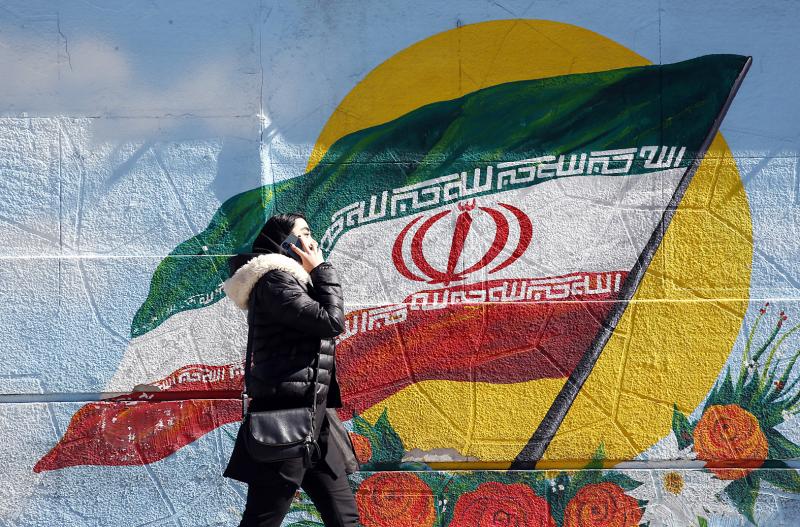After Iran last month imposed an Internet shutdown lasting several days in a southeastern region during a rare upsurge of unrest, advocates said the government is now using the tactic repeatedly when protests erupt.
Rights groups have said at least 10 people were killed when security forces opened fire on fuel porters in Saravan, Sistan-Baluchistan Province, on Feb. 22, prompting protests where live ammunition was used on unarmed demonstrators.
However, little information filtered out due to a near-total shutdown of the Internet in the impoverished region bordering Pakistan, which has a large ethnic Baluch population and has been a flashpoint for cross-border attacks by separatists and Sunni extremists.

Photo: EPA-EFE
The Internet shutdown was a “measure authorities appear to be using as a tool to conceal gross human rights violations and possible international crimes such as extrajudicial killings,” freedom of expression groups Access Now, Article 19 and Miaan Group said in a joint statement with Amnesty International.
Campaigners said such shutdowns, which recall those seen in the past few months during street protests in Belarus and Myanmar, have a dual purpose.
They seek to prevent people from using social media messaging services to mobilize protests, but also hinder the documentation of rights violations that could be used to rally support at home and abroad.
Iran in November 2019 imposed nationwide Internet limits during rare protests against fuel hikes that the authorities suppressed in a deadly crackdown. Rights groups fear the same tactic risks being used again during potentially tense presidential elections this summer.
The Sistan-Baluchistan shutdown saw mobile Internet services halted, effectively shutting down the Web in an area where mobile phones account for more than 95 percent of Internet use.
“It is aimed at harming documentation and the ability of people to mobilize and coordinate,” Mahsa Alimardani, Iran researcher with the Article 19 freedom of expression group, told reporters. “It helps the authorities to be able to control the narrative.”
State media said there were attacks on government buildings in Saravan and that a policeman was killed when unrest spread to the provincial capital, Zahedan.
The governor of the city’s region, Abouzarmahdi Nakahei, denounced “fake” reports of deaths in the protests, blaming “foreign media.”
Alimardani said that targeting mobile Internet connections made the shutdown different from the one seen in November 2019.
Then, Iranians were cut off from international Internet traffic, but were able to continue highly filtered activities on Iran’s homegrown Internet platform the National Information Network.
She said the documentation of atrocities was the authorities’ biggest fear.
“It is a big rallying call when these videos go viral,” she said.
Unlike some other minority groups in Iran, such as Arabs and Kurds, the Baluch do not have major representation in the West to promote their cause and draw attention to alleged violations on social media.
Most Baluch adhere to the Sunni branch of Islam rather than the Shiism dominant in Iran and rights groups also say Baluch convicts have been disproportionately targeted by executions.
According to information received by Amnesty from Baluchi advocates, at least 10 people were killed on Febr. 22 when Revolutionary Guards “unlawfully and deliberately used lethal force” against unarmed Baluchi fuel porters near Saravan.
The crackdown came after the security forces blocked a road to impede the work of the porters, who cross between Iran and Pakistan to sell fuel.
Amnesty added that security forces also used unlawful and excessive force against people who protested in response to the killings, as well as bystanders, leaving another two dead.
Amnesty’s Iran researcher Raha Bahreini told reporters that the toll was a “minimum figure” that Baluchi advocates verified after confirming the victims’ names.
The New York-based Center for Human Rights in Iran (CHRI) have an even higher toll of 23 dead, citing local sources.
The Internet shutdown “severely restricted the flow of information to rights defenders from contacts and eyewitnesses,” Bahreini told reporters. “The authorities are fully aware they are preventing the outside world from learning about the extent and gravity of violations on the ground,” she added.
She said such unlawful shutdowns had turned into a “pattern” in Iran.
UN High Commissioner for Human Rights spokesman Rupert Colville said that the shutdown has impeded precise verification of the death toll and had “the apparent purpose of preventing access to information about what is happening there.”
Iran blocked Internet access “to kill protesters indiscriminately and out of the public eye, and prevent protesters from communicating and organizing, ” the CHRI said.
“Security forces killed hundreds of protesters with impunity in November 2019, and they are doing it again now,” CHRI director Hadi Ghaemi said.

‘EYE FOR AN EYE’: Two of the men were shot by a male relative of the victims, whose families turned down the opportunity to offer them amnesty, the Supreme Court said Four men were yesterday publicly executed in Afghanistan, the Supreme Court said, the highest number of executions to be carried out in one day since the Taliban’s return to power. The executions in three separate provinces brought to 10 the number of men publicly put to death since 2021, according to an Agence France-Presse tally. Public executions were common during the Taliban’s first rule from 1996 to 2001, with most of them carried out publicly in sports stadiums. Two men were shot around six or seven times by a male relative of the victims in front of spectators in Qala-i-Naw, the center

Incumbent Ecuadoran President Daniel Noboa on Sunday claimed a runaway victory in the nation’s presidential election, after voters endorsed the young leader’s “iron fist” approach to rampant cartel violence. With more than 90 percent of the votes counted, the National Election Council said Noboa had an unassailable 12-point lead over his leftist rival Luisa Gonzalez. Official results showed Noboa with 56 percent of the vote, against Gonzalez’s 44 percent — a far bigger winning margin than expected after a virtual tie in the first round. Speaking to jubilant supporters in his hometown of Olon, the 37-year-old president claimed a “historic victory.” “A huge hug

Two Belgian teenagers on Tuesday were charged with wildlife piracy after they were found with thousands of ants packed in test tubes in what Kenyan authorities said was part of a trend in trafficking smaller and lesser-known species. Lornoy David and Seppe Lodewijckx, two 19-year-olds who were arrested on April 5 with 5,000 ants at a guest house, appeared distraught during their appearance before a magistrate in Nairobi and were comforted in the courtroom by relatives. They told the magistrate that they were collecting the ants for fun and did not know that it was illegal. In a separate criminal case, Kenyan Dennis

The US will help bolster the Philippines’ arsenal and step up joint military exercises, Manila’s defense chief said, as tensions between Washington and China escalate. The longtime US ally is expecting a sustained US$500 million in annual defense funding from Washington through 2029 to boost its military capabilities and deter China’s “aggression” in the region, Philippine Secretary of Defense Gilberto Teodoro said in an interview in Manila on Thursday. “It is a no-brainer for anybody, because of the aggressive behavior of China,” Teodoro said on close military ties with the US under President Donald Trump. “The efforts for deterrence, for joint resilience